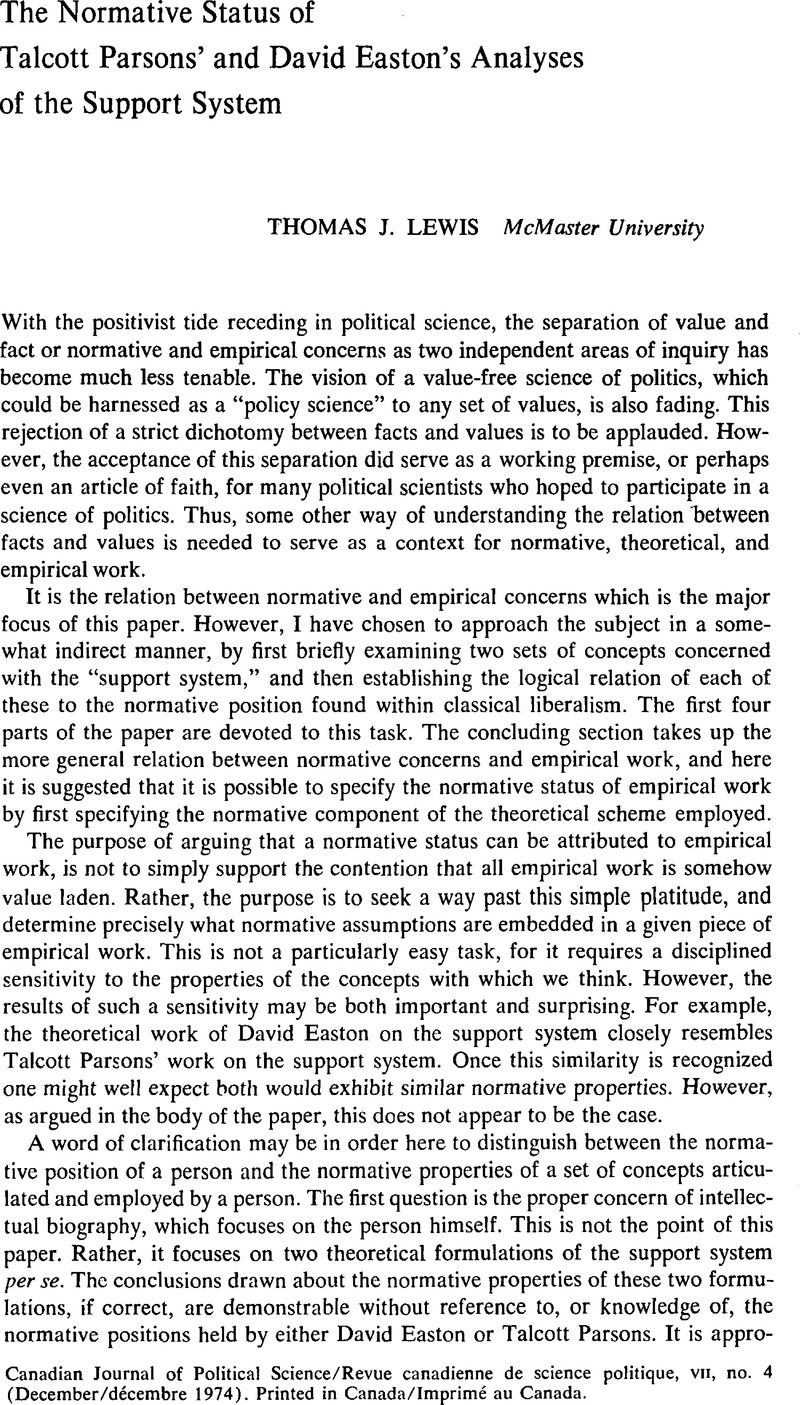Published online by Cambridge University Press: 10 November 2009

1 A Framework for Political Analysis (Englewood Cliffs, nj, 1965), and A Systems Analysis of Political Life (New York, 1965).
2 “The Political Aspect of Social Structure and Process,” in Varieties of Political Theory, ed. Easton, David (Englewood Cliffs, NJ, 1966)Google Scholar; Sociological Theory and Modern Society (New York, 1967), chap. 8, 10, 11.
3 Parsons, Sociological Theory and Modern Society, 228–34, 350.
4 Ibid., 229.
5 Ibid., 361.
6 Ibid.
7 Ibid., 362.
8 Ibid., 363.
9 Ibid.
10 Ibid., 233.
11 Ibid., 365.
12 Ibid., 367.
13 Ibid., 231.
14 Ibid., 233–4.
15 A Systems Analysis of Political Life, 475.
16 Ibid., 474.
17 Ibid.
18 Ibid., 475.
19 Ibid.
20 Ibid., 157.
21 Ibid., 158.
22 Ibid., 268.
23 Ibid., 275, 276.
24 Ibid., 277
25 Ibid., 269
26 Ibid., 280.
27 This is part of the quotation from Easton which appears above. The terms within the parentheses have been added to illustrate the transformation in the idea of labour, which would be required to maintain a parallel between political and economic exchange. The point, of course, is to demonstrate the extent of the difference between diffuse support and generalized support.
28 Leviathan, ed. Oakeshott, Michael (New York, 1962).Google ScholarHobbes’, earlier work De Cive, ed. Lamprecht, Sterling P. (New York, 1949)Google Scholar, presents his political ideas without many of the metaphysical assumptions and polemical thrusts contained in Leviathan. As such it provides somewhat easier access to the main content of Hobbes’ political thought.
29 The Second Treatise of Government, ed. Peardon, Thomas P. (New York, 1952).Google Scholar
30 For a concise contemporary statement of this classical liberal position see Tussman, Joseph, Obligation and the Body Politic (New York, 1960).Google Scholar
31 For an interpretation of the problem of obligation within the classical liberal tradition and the development of the concept of “hypothetical consent,” see Pitkin's, Hanna “Obligation and Consent-i,” American Political Science Review, LIX, 4 (December 1965), 990–9CrossRefGoogle Scholar, and her second article “Obligation and Consent-ii,” American Political Science Review, LX, no. 1 (March 1966), 39–52.
32 I have chosen to explicate the concepts of equality and consent in terms of classical liberalism for it is here, in the work of Hobbes and Locke, that we are provided with a clear articulation and a forceful recommendation of these concepts as a normative criterion. It is the acceptance of the crucial concept of equality, which constitutes the decisive break between modern political theory and its predecessors. Despite major qualifications and reservations, the concept of equality continues as the basic touchstone of political practice and political thought in the twentieth century.
33 The basis of contemporary welfare economics is the Paretian value judgment which is simply a re-statement of the principle invoked by Locke to justify property and civil society; Second Treatise, chap. v. For a statement of the way in which welfare economics is based on the Paretian value judgment see Winch, D.M., Analytical Welfare Economics (Harmondsworth, Eng., 1971), 13–14.Google Scholar Winch does not acknowledge the origins of the constraint in classical liberalism.
34 To define the political function in such a way as to exclude socialization is not to ignore the process or to claim that it does not occur but, rather, to set this process apart from the political such that the political can be judged.
35 A Systems Analysis of Political Life, 13–16.